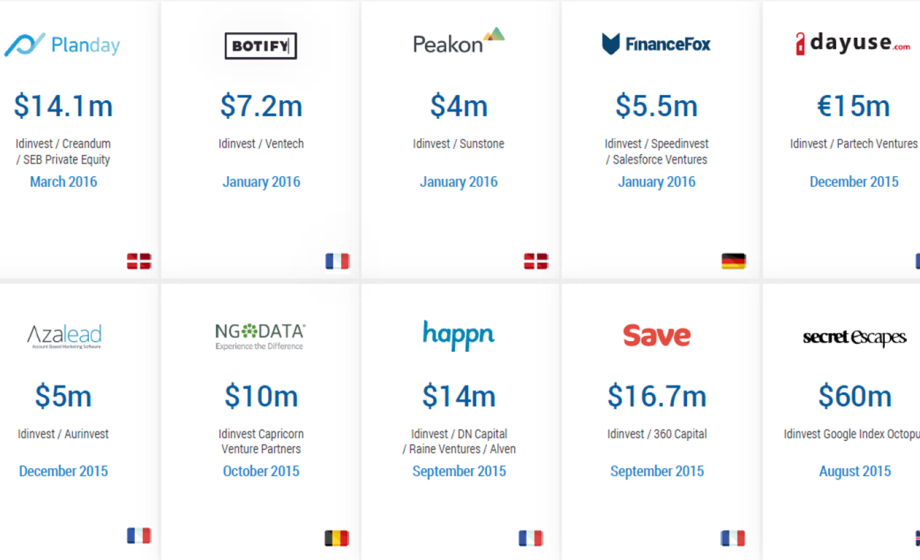Frichti, a French food delivery startup, raised 12€ million and Planday, a Danish workforce management SaaS platform, scored 14€ million this week, both from IdInvest, underscoring the growing trend of European startups raising growth-stage funding in 2016. Following Tech.eu’s market report finding that French venture capital is weak both in Series B and international funding, these investments are key in determining whether France’s activity in 2015 was an anomaly or a trend.
Frichti has as yet-unconfirmed plans to expand to other countries and Planday already boasts customers in the US, UK and Nordics and intends to scale aggressively in these markets. The “no-man’s-land” reputation that precedes Series B funding has left a gap in France that urgently requires filling – Idinvest, named by the Tech.eu report as one of France’s top 3 funds, is proving its chops as a smart partner for the notoriously difficult pre-scale, execution-oriented stage of growing startups.
Nonetheless, news this week that French startups raised 1€ billion in 2015, while confirming France’s place as a global tech powerhouse, reinforced familiar concerns that the French ecosystem remains insular. Idinvest’s tagline is “Strategic investment, innovation and international reach”; the fund currently has 6€ billion under its management and 50% of its last 10 deals were non-French. While Benoist Grossmann, IDInvest’s managing director, has previously stated that the fund “invests all across Europe, of course with a focus in France because we are based in France”, it will be gratifying for some to see its gaze turn outside the French ecosystem.
We asked Idinvest Investment Director Guillaume Durao about French venture capital’s reputation for risk-aversion and insularity and he confirmed that, yes, France sees few Series B investments, even fewer Series C, and on the whole the size of rounds is much lower in France than elsewhere. But as for whether this merits criticism, Durao was very frank: he thinks it’s BS.
“You could ask, ‘Are we lean? or are we not brave?’ But the explosion of digital startups in France is [less than] 5 years old. We don’t have enough companies big enough for this stage of investment. If it were a question of bravery, you’d see foreign investment coming into France – but that’s not happening yet either. So it’s about the maturity of the ecosystem. It’s harsh to say otherwise.”
Durao spoke at length about his enthusiasm for Nordic startups like Planday who quickly outgrow their local markets and prioritize scaling internationally. I asked why Idinvest doesn’t look for more investments outside France.
“Look, there’s a lot to do at home, so it makes sense to focus here. There’s a lot of talent in France and it’s our responsibility to nurture and support this ecosystem. We stick to our DNA – when there’s opportunities, we’re not afraid to invest elsewhere – but you invest where you have a strong network. You invest locally. I don’t think we’re different, or doing a worse job, than VCs outside France. I think more and more, we’ll see French investors becoming pan-European and making more international investments. [French venture capital is] pretty ballsy, pretty bullish. We’re not scared to take risks.”
He reeled off a list of French VCs including Partech and Ventech who regularly invest outside of France and recruit non-French partners. Just when I felt suitably chastened, Durao made it real simple:
“It’s basic mathematics: the more companies that raise Seed and Series A, the sooner we’ll see companies raising bigger rounds and VCs having the capital to diversify. We’re just 20 years behind the US, but we’ll catch up.”
Durao followed our exchange with an email containing plenty of evidence to support the robustness of French venture capital, and maintained that any lag simply reflects the nascency of the French ecosystem. “You’ll see – bigger rounds with great French companies and internationalization of deal flow will come. We’re lucky to have a great ecosystem in Paris.”
While Durao doesn’t dispel the notion that France has been trending towards domestically-focused, growth-stage funding, his arguments bring sound reason to the conversation. We might yet see more later-stage activity in 2016 but if Durao is right, this will be an organic progression rather than a strategic one.


